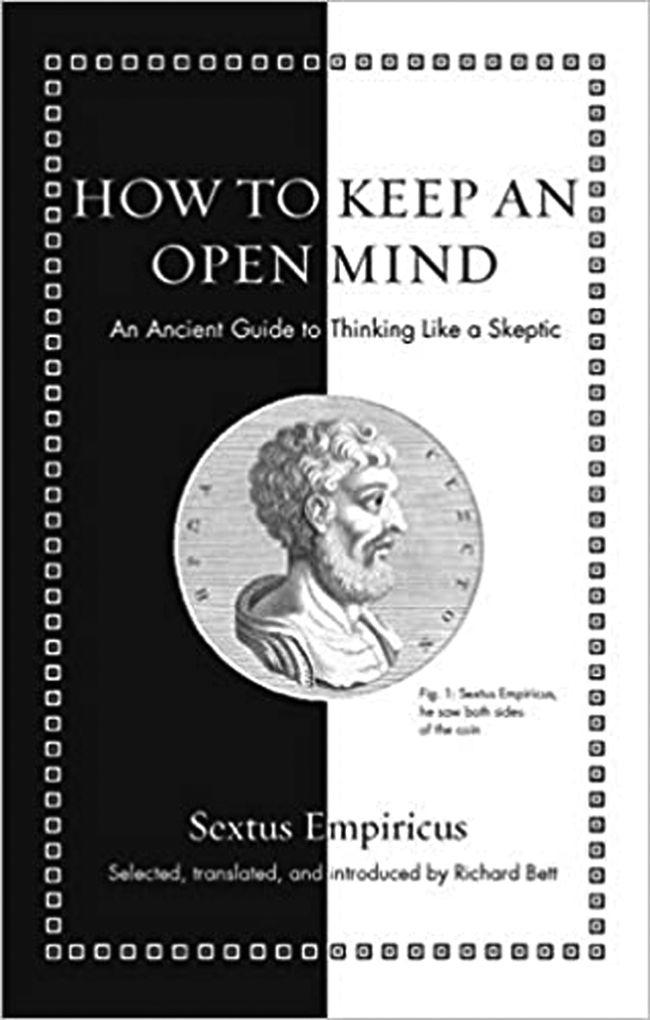
When many today say that they are sceptics, as a Classicist it is indispensable to have read Richard Bett's scholarly, approachable, slender introduction to Skepticism, so that you can explain how, at least by ancient standards, they are probably not Skeptics: “διόπερ οὐθετέρῳ προστιθέμεθα ὅσον ἐπί τοῖς λεγομένοις ὑπὸ τῶν δογματικῶν, ἀλλ’ ἐπέχομεν… – For this reason we attach ourselves to neither side (as regards what is said by dogmatists), but suspend judgement…” (pp. 178–179).
This book does not pull its punches, but could be used with talented and precocious sixth-form Greek, Classical Civilisation, R.S. and Philosophy classes to extend students beyond Plato and Aristotle. This reviewer was pleasantly surprised to discover that this is not only a discussion of Sextus Empiricus’ philosophy, but also an edition of his actual writings in a Greek-English parallel-text format.
Bett's introduction is thoughtful, covering Sextus’ biography, his school of Skepticism (there were varieties) and what we can learn from it today – was it more important in a world where there was less science and more discussion about the ‘what-ifs’? Bett writes with relaxed humour, ‘So while it would not really be accurate to say that Sextus advocates being open-minded, a recommendation to be open-minded is, in effect, what one can gain from approaching his writings in a sympathetic yet critical spirit’ (xxxvi–xxxvii).
There is a ‘Note on the Text’ explaining his layout and approach to translation and textual criticism. His translation is readable whilst remaining true to the Greek; he makes use of modern phrases sparingly, effectively and consistently. His chapters look at what the philosophy is, its standard arguments, phrases to have at the ready if challenged, ending with further details about Logic, Physics and Ethics. The sections about Physics and Ethics are most fascinating and cleverly saved until the end after the tougher meditation on Logic. The proof of a non-providential divinity is enjoyable (pp. 153–169) as is the discussion that nothing is good or bad or indifferent (pp. 181–189). It is a shame that Bett chooses to leave out the section on whether there is a technē for living well as it could have allowed for discussion of Stoic principles (he is justified though in that this is a book about Skepticism and not the place for long digressions upon Stoicism). The Roman font used is a little strange at times: ‘a’, ‘h’ and ‘y’ can appear crushed, a result of printing maybe?
Footnotes take his thoughts further as do his interventions within the text. These interventions, although they break up the flow of Sextus’ words are necessary as Bett has occasionally excised sections which he deems repetitive or convoluted (he summarises any part removed). Additionally, although the text is mostly from Sextus’ Outlines of Pyrrhonism, Bett includes relevant extended sections from Sextus’ other (admittedly few) works – Against those in Disciplines and Skeptical Treatises. There is a list of works for further reading and a detailed glossary of terms and personages.
I particularly enjoyed, in addition to learning about an obscure school of philosophy, being able to engage with Sextus’ Greek prose which was refreshingly familiar: the vocabulary and syntax is Classical, but less arcane than Lucian's and Plutarch's hyper-Attic. There is nonetheless obscure vocabulary to stretch a reader and novel nuances of complex meaning from seemingly familiar verbs and nouns.
It is a nice book, hardback, well-cased, with a good-quality cover and pages which are pleasant to turn.




